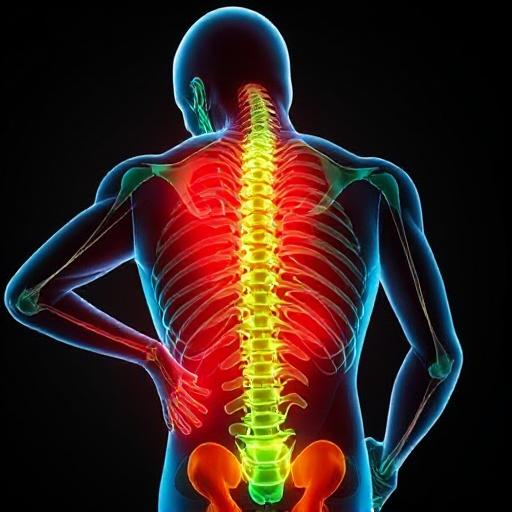Causes, Symptoms, and Treatment Experiencing back pain when coughing can be concerning, especially if it disrupts daily activities. While it may be due to minor issues like muscle strain, it can also indicate more serious underlying conditions.
This article explores the common causes, symptoms, and treatment options for back pain triggered by coughing, along with prevention strategies to reduce future occurrences.
Common Causes of Back Pain When Coughing
- Back Muscle Strain:
Frequent or forceful coughing can strain the muscles in your back, resulting in sharp or aching pain. This typically happens due to overuse or poor posture during coughing, which can put excessive stress on the back muscles.
- Spinal Disc Herniation:
Coughing can increase pressure on the spine, worsening the pain and potentially causing discomfort that radiates to other areas of the body.
- Spinal Stenosis:
This condition involves the narrowing of spaces within your spine, putting pressure on the nerves. Coughing can intensify the discomfort, especially if nerve roots are compressed.
- Degenerative Disc Disorder:
Over time, the discs between vertebrae wear down, causing chronic back pain that can worsen with coughing. This degeneration can lead to reduced flexibility and increased susceptibility to injury.
- Osteoporosis:
Weak, brittle bones can lead to compression fractures in the spine, making coughing painful. Osteoporotic fractures are often unnoticed until triggered by sudden movements like coughing.
- Infections or Inflammatory Conditions:
Infections like osteomyelitis or conditions such as arthritis can cause back pain aggravated by coughing. Inflammatory diseases can lead to swelling and pressure on spinal structures.
- Serious Conditions (Rare Cases):
Lung infections, tumors, or other organ-related issues can sometimes cause referred back pain when coughing. Conditions like pleurisy, kidney stones, or abdominal aortic aneurysms may present with back pain symptoms.
Symptoms to Watch For

Sharp, stabbing, or dull aches in the back when coughing Pain that radiates to the legs or arms Numbness, tingling, or weakness in extremities Difficulty standing or walking without support Unintentional weight loss, fever, or night sweats (seek medical attention immediately) Persistent pain that doesn’t improve with rest or over-the-counter treatments
When to See a Doctor
Seek medical attention if your back pain is: Severe or worsening over time Accompanied by neurological symptoms (numbness, weakness, loss of bladder/bowel control) Associated with chest pain, shortness of breath, or signs of infection Linked to recent trauma, such as a fall or accident Present with symptoms of systemic illness, including fever or chills
Diagnosis
- A healthcare provider may perform:
Physical Examination: Assessing mobility, reflexes, pain points, and neurological function Imaging Tests: X-rays, MRI, or CT scans to identify structural issues, fractures, or herniations Blood Tests: To rule out infections, inflammatory conditions, or systemic illnesses Nerve Studies: Electromyography (EMG) to assess nerve function if neuropathy is suspected
Treatment Options
- Home Remedies:
Rest and avoid activities that worsen the pain Apply heat or ice packs to the affected area to reduce inflammation Over-the-counter pain relievers (ibuprofen, acetaminophen) for mild discomfort Gentle stretching exercises once the acute pain subsides Maintaining proper hydration and nutrition to support recovery
- Medical Treatments:
Prescription Medications: Muscle relaxants, anti-inflammatories, or nerve pain medications Physical Therapy: Exercises to strengthen back muscles, improve posture, and increase flexibility Epidural Steroid Injections: For severe nerve-related pain or inflammation Chiropractic Care: Manual adjustments may help relieve mechanical back pain (consult with a healthcare provider first)
- Surgical Intervention:
Required in rare cases for conditions like herniated discs, spinal stenosis, or tumors Procedures may include discectomy, laminectomy, or spinal fusion depending on the underlying cause Surgery is typically considered after conservative treatments have failed or if there’s a risk of permanent nerve damage
Prevention Tips:
Practice good posture when sitting, standing, and during daily activities Maintain a healthy weight to reduce strain on the spine Exercise regularly to strengthen back and core muscles, enhancing spinal support Quit smoking, as it can weaken spinal health and reduce circulation Use proper techniques when lifting heavy objects to prevent back strain Manage chronic conditions like arthritis or osteoporosis with regular medical check-ups Stay hydrated and maintain a balanced diet rich in calcium and vitamin D for bone health
Complications of Untreated Back Pain
If back pain when coughing is left untreated, it can lead to:Chronic pain that affects daily activities and quality of life Nerve damage resulting in permanent numbness or weakness Increased risk of falls due to impaired mobility Progression of underlying conditions, such as spinal stenosis or infections.
Lifestyle Adjustments for Long-Term Relief
Incorporate stretching and strengthening exercises into your routine Adopt ergonomic workspaces to reduce back strain Practice stress management techniques like yoga or meditation to relieve muscle tension Ensure adequate sleep on a supportive mattress to promote spinal health
FAQ’s
1 What causes back pain when coughing?
Common causes include muscle strain, herniated discs, spinal stenosis, and in rare cases, infections or tumors.
2 When should I see a doctor for back pain while coughing?
Seek medical help if the pain is severe, worsening, or accompanied by symptoms like numbness, fever, or chest pain.
3 How is back pain when coughing diagnosed?
Doctors may perform physical exams, imaging tests (X-rays, MRI), and blood tests to identify the underlying cause.
4 What are the treatment options for back pain triggered by coughing?
Treatments range from home remedies (rest, heat/ice packs) to medications, physical therapy, or surgery for severe cases.
5 Can I prevent back pain when coughing?
Yes, by maintaining good posture, exercising regularly, lifting properly, and managing weight to support spinal health.
Conclusion:
Back pain when coughing can result from simple muscle strain or signal more serious health issues. Monitoring your symptoms and seeking medical advice when necessary ensures timely diagnosis and treatment. Prioritizing spinal health through exercise, good posture, and preventive care can reduce the risk of future back pain episodes.
Read More Relevant Article:











